- HIV Co-Production Showcase: Sharing learnings from a participatory research project (Part 1)
- HIV Co-Production Showcase: Sharing learnings from a participatory research project (Part 2)
Over the last 18 months we have been working in partnership as a group of researchers and people living with HIV (two peer researchers and three advisory group members to undertake a co-produced peer research qualitative study exploring the experiences of COVID-19 among people living with HIV. This work is a collaboration between the Patient Experience Research Centre at Imperial College London and Positively UK.
As part of this participatory study, co-researchers undertook training on research ethics, the fundamental aspects of qualitative research, 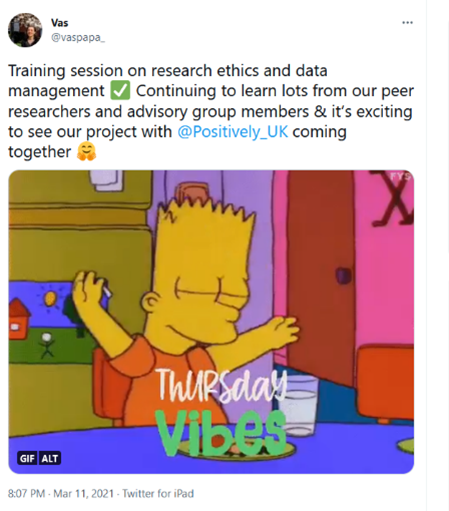 how to conduct and analyse interviews online and emotional wellbeing/safeguarding while undertaking research. This training enabled co-researchers to be involved in all stages of the research study including co-developing the ethics submission and interview topic guide, co-analysing interview transcripts and co-designing dissemination plans – as equal partners within the research team. In addition, our peer researchers conducted 2-3 interviews each (5 in total) as part of the study.
how to conduct and analyse interviews online and emotional wellbeing/safeguarding while undertaking research. This training enabled co-researchers to be involved in all stages of the research study including co-developing the ethics submission and interview topic guide, co-analysing interview transcripts and co-designing dissemination plans – as equal partners within the research team. In addition, our peer researchers conducted 2-3 interviews each (5 in total) as part of the study.
Through this project, we have enriched our understanding of the experiences of people living with HIV throughout the COVID-19 pandemic, and in parallel, we have also learnt a lot about working in partnership to co-produce research.
Since the end of this project, we have undertaken several activities to share the key learnings from undertaking a participatory project, as well as findings from our research study, with internal and external stakeholders. We have:
- Launched a freely available ‘Peer Research Training Resource’ which aims to support academics and public involvement practitioners who want to train people with lived experience to become co-researchers in qualitative/interview-based research studies. The resource was developed from the online training sessions we used to train our public partners for this study, but we have developed this so it can be adapted for other health research areas.
- Facilitated a workshop which was co-designed and co-delivered with our co-researchers at the NCRM Research Methods e-Festival in October 2021. The reflective workshop was titled, ‘Building and Sustaining Relationships in Participatory Action Research’.
- Led a one-hour workshop with our public partners on our experiences of participatory research at Imperial College, London’s Engagement Day in April 2022– an internal event aimed at researchers working at Imperial College and co-delivered with a co-researcher.
- Joined Positively Effect’s (a HIV non-profit organisation in Canada) podcast (‘Pozcast’) to share our experiences of conducting a HIV peer research project exploring the impact of COVID-19 on people living with HIV in the UK. On the podcast, one of our peer researchers talks about her experience of being involved in the project. The episode title is Peer Research across the pond: a fascinating UK study exposes barriers and bias bolstered by the pandemic and is freely available online and through most apps (including Spotify).
However, to further celebrate the success of this project, widen the dissemination of our research findings and our participatory approach, we have co-designed a HIV Co-Production Showcase Event, taking place this week.
In this two-part blog, find out how we worked together to design this event (part 1) and our reflections following from the day (part 2).
Working in partnership to co-design the event
This event was initially proposed by our co-researchers, and in line with the ethos of our project, the event itself needed to be co-designed. We undertook a series of four online co-design meetings to develop all aspects of the event including the aims of the event, the venue and date, the audience who would be invited, the format of the event and each team member’s roles on the day.
We used Google Jamboard as a collaborative space for everyone to add their ideas and to help us reach a consensus on each aspect of the planning.
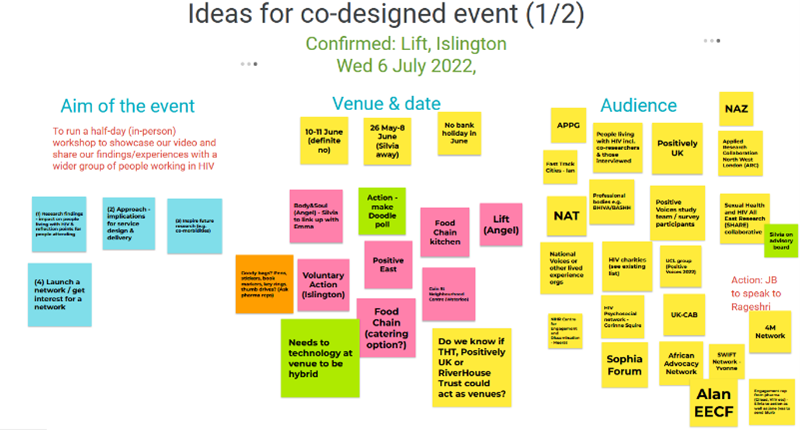
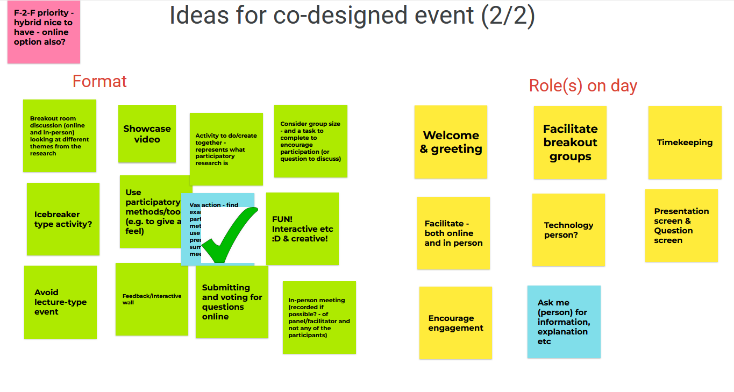
Our aims
When discussing what we wanted to achieve from the event, we settled on three main goals. We wanted to:
- share the findings and reflections from our work together as a group of academics and co-researchers
- inspire future research and opportunities for participatory research through facilitated discussion
- gather interest for a network for HIV researchers, clinicians and people living with HIV interested in participatory research.
The format and content of our event then began to develop around each of these aims, including who we wanted to reach and how we would achieve it.
Ensuring we reach a relevant audience
We needed to make sure we were inviting individuals who represented everyone in the HIV community. We therefore chose to take a targeted approach to our invitations to this event, this included people living with HIV (including those interviewed in our study), HIV clinicians, researchers, policymakers, and charities. Through our co-researchers and, wider HIV networks’ (including Positively UK’s network) we were able to reach and invite, key individuals to ensure the event represents a diversity of views.
Fostering a safe and collaborative environment
The team felt it was important that this event took place in a community venue, rather than a university venue. We wanted the space to be accessible and welcoming which would feel like a safe environment free from any associations. We also wanted a space which would foster collaboration. We chose Lift in Islington (London) for our venue, as it had previously been used by Positively UK and met the criteria we were looking for in terms of accessibility, having enough space to do group work and being able to share slides.
Supporting our public partners to be involved
Throughout our co-design meetings leading up to the event, we discussed how each of the public partners would like to be involved in the workshop, and what skills and experience they felt they could bring to the session. We have developed a detailed briefing document in advance of the session, which included all information needed for the event, such as details of each person’s role on the day and a detailed explanation of each activity. We also held a final briefing session shortly before the event with our public partners to have a final discussion on the plan for the day and answer any questions in advance of the event.
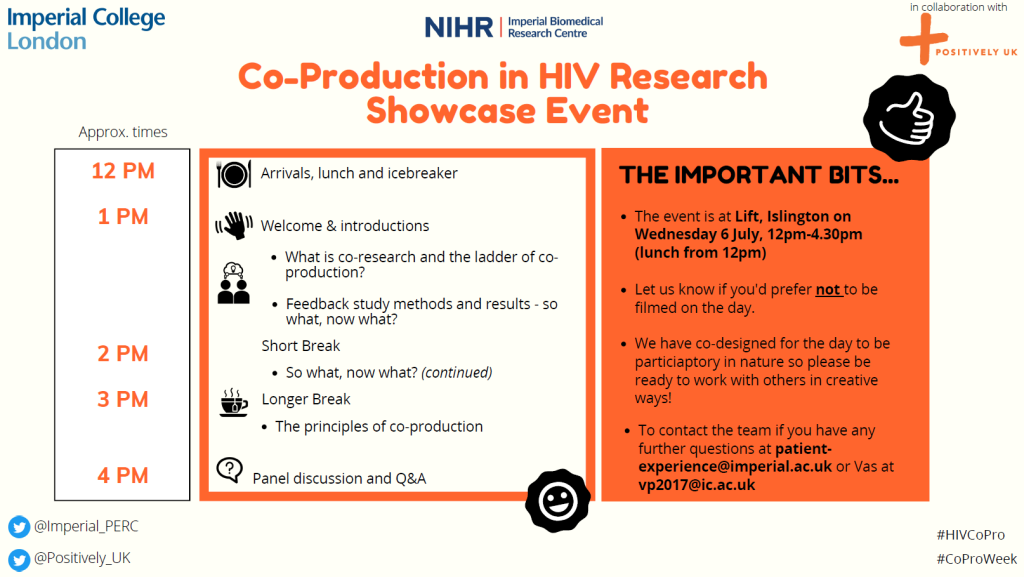
Applying principles of participation and co-production to the format
From the start of co-designing this event, all team members felt that the activities throughout the day needed to be interactive, creative, and collaborative. We have specifically chosen activities which require attendees from different roles in the HIV community (i.e., clinicians, people living with HIV, commissioners) to discuss and contribute to activities in partnership. By taking this approach, we hope attendees will gain their own experience of working in partnership. This means sharing power, reciprocity, including all perspectives and skills, building and maintaining relationships and respecting and valuing working together through the activities.
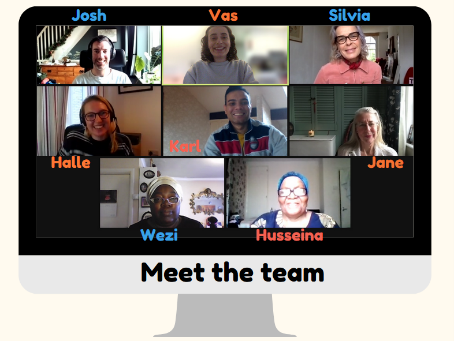
What next?
Our event takes place during #CoPro week on 6th July 2022. During the event we will have a filmmaker present who was capturing the team’s reflections of taking part in this participatory project. We hope to share this video shortly as a means of sharing our learnings with an even wider audience.
We will also be producing part two to this blog to detail how the event went and what we learnt from the day.
To stay updated, follow our Co-Production in HIV Research Showcase hashtag (#HIVCoPro), or follow the Imperial Patient Experience Research Centre (@Imperial_PERC) or Positively UK (@Positively_UK) to see live tweets from our event and to be notified when part two of this blog series is released.
The project is a collaboration between researchers at the Imperial Patient Experience Research Centre and Positively UK.
If you would like further information about the study or have any questions, please contact Vas at vasiliki.papageorgiou17@imperial.ac.uk or @vaspapa_
Note: This work is one part of a wider project exploring experiences of the COVID-19 pandemic from HIV clinical- and community-based workers and volunteers (you can find out more about the other parts of this study here). It also feeds into a larger doctoral research project (using the 2017 Positive Voices survey data) looking to explore the impact of social determinants (e.g. housing, employment, income etc.) on the health and wellbeing of people living with HIV.
This work is funded by Imperial College London’s Societal Engagement team 2020 Rapid Response Seed Fund and Participatory Research Seed Fund and supported by an ESRC LISS Doctoral Training Partnership (DTP). The work would not have been possible without the generous support and time of our co-researchers and study participants.
